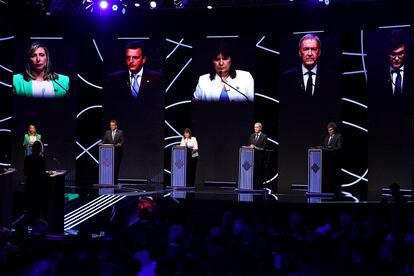The economy, the Pope, the dictatorship and the ‘cuddly kitten’ dominate Argentina’s presidential debate
The first encounter between the presidential candidates ended without a clear winner or any significant blows that could tip the balance among the three main contenders, Javier Milei, Sergio Massa and Patricia Bullrich


Argentina’s presidential debate appeared to have all the markings of a game-changing event, but fizzled out just as the candidates took the stage on Sunday night in Santiago del Estero, over 600 miles north of the capital, Buenos Aires. The far-right Javier Milei, who has occasionally wielded a chainsaw at his rallies to signify the cuts he intends to impose on the public sector, chose to comb his hair, put on his glasses, and stick to the script. He was the candidate to beat, not only because he won the most votes in the August 13 primaries, but also because the lead-up to the debate preview was marked by speculation as to whether he would take to the podium without the outbursts that swept him along in the polls.
Milei smiled dismissively in the face of criticism, hesitated to explain his educational plan, and for the first time dared to deny the 1976-1983 military dictatorship. “The state forces committed excesses, but the ERP and Montoneros terrorists killed, planted bombs and committed crimes against humanity,” he said in reply to criticism from leftist candidate Myriam Bregman. It was the tensest moment of a debate that initially became entangled in an economic discussion and deflated immediately afterward, because the candidates had already exhausted their five allotted rights to reply.
No clear winner emerged from the debate. The Peronist candidate, Sergio Massa, took more blows than the rest of the candidates, but they were not as hard as those received by Patricia Bullrich of the traditional right wing, who tripped over herself while trying to explain her economic plan. Among the crossfire, the anti-Kirchnerist Peronist Juan Schiaretti called for federalism. The presidential election is three weeks away, and the candidates will meet again next Sunday for the final debate in the capital.
“Patricia, your economic proposal was not clear to me”
Bullrich, Mauricio Macri’s former Security Minister, is third in the polls behind Milei and Massa. The debate was her chance to stage a comeback, but the traditional right-wing candidate got tangled up when trying to explain her economic proposals. “We are all crying out for an end to the anguish in which we are living,” she said as she presented her economic plan. “I am coming to eliminate inflation,” she announced, without elaboration. The two minutes allotted for the topic were muddied in a vague description of Argentina’s greatest evil. “When there is no inflation, you can buy without surprises. You can buy a house. Without inflation, you’re not going to buy it,” she confusedly said. During the cross questions, Milei and Massa coincided in pressing her to explain herself. “Patricia, your economic proposal was not clear to me,” said the Peronist during direct questioning. Milei accused her of “running away” and improvising.
Economy Minister apologizes for financial crisis
Bullrich came across poorly on the economic issue, but most of the attacks were launched against Massa, the current Minister of Economy. Massa presented proposals including sending tax evaders to jail and a digital currency for Argentines with money abroad to be able to bring it back to the country without any consequences. However, nothing could deflect the criticism he received as the visible face of the government of Alberto Fernández and Cristina Kirchner, with inflation standing at 124% in August and poverty affecting over a third of the population. “I am clear that inflation is a huge problem and that the government’s mistakes have hurt the people and I apologise for them,” Massa said at the beginning of the debate, before attempting to distance himself from the current administration: “Now comes a new government; mine.”
Milei relativizes the military dictatorship
The audience was allowed to choose one of the topics of the debate and put human rights on the table, placing the focus on Milei and his vice-presidential candidate, Victoria Villarruel, the daughter and granddaughter of military men, who recently described the dictatorship as “an internal armed conflict, a low-intensity war.” Milei, who as a TV talk show host criticized the atrocities of the dictatorship and as a candidate the economic policies of the military, stood behind Villarruel on Sunday. “We value the vision of memory, truth, and justice. Let’s start with the truth: there were not 30,000 disappeared, there are 8,753,” he said, questioning the number of disappeared as stated by organizations such as Mothers and Grandmothers of Plaza de Mayo. “In the 1970s there was a war,” added Milei, contrary to what was determined by the historic Trial of the Juntas, which in 1985 led to the conviction of dictator Jorge Rafael Videla and the main perpetrators of the dictatorship. “We are against the one-eyed view of history,” he said, adding government forces committed “excesses” while leftist guerrilla groups committed “crimes against humanity.”
The most important Argentine in history
In recent weeks, Milei has found a fierce foe in the Catholic Church. The far-right candidate has spent years insulting Pope Francis as a “filthy lefty,” “imbecile,” “communist,” and “representative of the Evil One.” Priests in the country’s unofficial neighborhoods have been mobilizing in support of the pontiff. The direct confrontation between Massa and Milei was centered on this discussion. When it was his turn to question Milei, the Peronist demanded a public apology. “Argentina has millions of Catholic faithful and you offended the head of the Church,” he told him. “I want you to take advantage of these 45 seconds to apologize to the Pope, who is the most important Argentine in history.” “My statements were made in a context when I was not yet in politics,” Milei meekly replied. “I have no problem repeating that I am sorry for that.”
The left against the rest
The eve of the debate was marked by a scandal caused by a high-ranking Peronist official who was discovered vacationing in Marbella with a model on a private yacht. The table seemed to be set for the attack against Massa, but the issue flew under the radar among other more pressing matters. Bregman, of the Workers’ Left Front, did bring it up: “While they starve the people they go on their luxury yachts to stroll around Europe,” she said, before turning her attention to the far-right candidate: “Milei is not a lion, he is a cuddly kitten of economic powers. He is an employee of big businessmen,” also accusing him of “dirtying” the word freedom. “When Milei talks about freedom, he talks about the freedom to fire you without severance pay. Freedom for him is, if you want health, pay for it. He even defends the freedom to pollute rivers. In short, freedom for Milei is every man for himself.”
Bregman eloquently confronted Milei’s economic plan, Massa’s current economic management and Bullrich’s past handling of security. She was so even-handed in her criticisms that, in the round of direct cross-questioning, Massa chose to ask her if she really thought it was the same thing if Peronism or the ultra-right was governing. “I believe that the problem the country has is another one,” she replied. “I think it is time to say enough is enough, to stop thinking about voting for the less-bad-than-the-other and start having convictions, principles and values.” It remains to be seen whether Bregman was convincing enough to add votes to the 2.65% she garnered in the August primaries when Argentina goes to the polls on October 22.
Sign up for our weekly newsletter to get more English-language news coverage from EL PAÍS USA Edition
Tu suscripción se está usando en otro dispositivo
¿Quieres añadir otro usuario a tu suscripción?
Si continúas leyendo en este dispositivo, no se podrá leer en el otro.
FlechaTu suscripción se está usando en otro dispositivo y solo puedes acceder a EL PAÍS desde un dispositivo a la vez.
Si quieres compartir tu cuenta, cambia tu suscripción a la modalidad Premium, así podrás añadir otro usuario. Cada uno accederá con su propia cuenta de email, lo que os permitirá personalizar vuestra experiencia en EL PAÍS.
¿Tienes una suscripción de empresa? Accede aquí para contratar más cuentas.
En el caso de no saber quién está usando tu cuenta, te recomendamos cambiar tu contraseña aquí.
Si decides continuar compartiendo tu cuenta, este mensaje se mostrará en tu dispositivo y en el de la otra persona que está usando tu cuenta de forma indefinida, afectando a tu experiencia de lectura. Puedes consultar aquí los términos y condiciones de la suscripción digital.








































